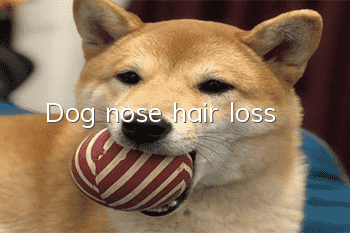Dog nose hair loss

Causes of dog nose hair loss:
1. Parasite bites. The parasitic bugs on the dog will constantly bite the dog's skin, causing itching and redness of the dog's skin, causing the dog to scratch the skin frequently, resulting in hair loss.
2. Seasonal alternation. Dogs usually lose a lot of hair during the change of seasons. Dogs need to change the thickness and amount of hair to protect themselves from the heat.
3. Food is too salty. Dogs that consume too much salt and have unbalanced nutritional intake will also suffer from hair loss.
4. Simple hair loss: Dogs will lose hair during the moulting period or when changing seasons. This is a normal phenomenon. Owners should not worry too much, as it will be relieved in the later stages.
5. Skin diseases: When a dog suffers from skin diseases such as mites, fleas, parasites, etc., the dog’s nose will suffer from severe hair loss. It must be treated with medicine in time, and it must be treated regularly. Do a good job of deworming.
6. Eczema: Dogs suffering from eczema may cause hair loss. The dog should be given anti-inflammatory drugs specially designed for pets.
7. Unbalanced nutrition: If the dog's nutrition is unbalanced, it will cause hair loss, and naturally there will not be too much hair on the nose. If it is caused by this aspect, the most important thing is to improve your diet and pay more attention to nutritional balance.
8. Hormone problem: If the skin on the nose is very smooth after the hair falls off, and the pores are almost invisible, and the dog is older, you can check thyroid hormone to see if it is caused by hormones. Hair loss, if so, oral thyroxine tablets are required.
Solutions to dog nose hair loss:
1. External deworming. Dogs need to be dewormed in time. If they are mites, fleas and other parasites, you can use Pointe-Abamectin transdermal solution to get rid of them.
2. Take care of your hair. Just help the dog take care of its hair more, and regularly supplement the dog with some vitamins and lecithin, which is beneficial to the growth of the dog's hair.
3. Eat a light diet. Keep your dog's diet light every day and feed him some fresh fruits and vegetables appropriately.
4. Seek medical treatment. Take your dog to the pet hospital for examination in time to find out the type of fungus or bacteria so that targeted treatment measures can be taken.
- Pimples on dogs
- What should I do if my dog doesn’t want to take a bath?
- How to train a Poodle to stand and walk? Common training methods for Poodles!
- How to save your dog from canine distemper
- Can’t you train a Husky? Husky training tips!
- What causes swollen dog paws?
- Dog hepatitis symptoms and prevention measures
- What is canine distemper? Symptoms and treatment of canine distemper in dogs!
- Things to note when raising a French bulldog
- What preparations do owners need to make before fostering a dog? Things to note when fostering a dog!



